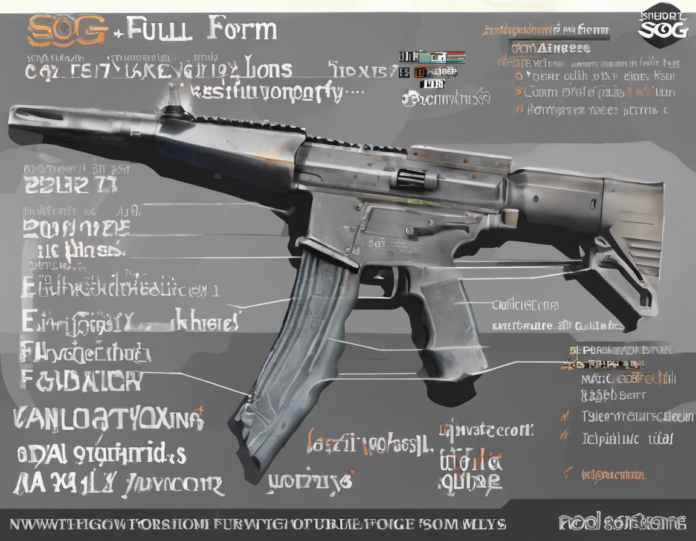Introduction:
Special Operations Group (SOG) is a term that has gained widespread recognition in various sectors, including the military, law enforcement, and corporate organizations. This article aims to provide a comprehensive understanding of the SOG full form and its significance in different contexts.
What Does SOG Stand For?
1. Military Context:
In the military realm, SOG commonly refers to the Special Operations Group. This specialized unit is tasked with conducting unconventional warfare, counter-terrorism operations, reconnaissance, and intelligence gathering missions. The SOG is composed of highly trained personnel who operate covertly and are equipped to handle high-risk assignments with precision and expertise.
2. Law Enforcement Usage:
In law enforcement agencies, SOG is often used to indicate the Special Operations Group or Special Operations Group. These units are responsible for responding to critical incidents, such as hostage rescue operations, high-risk warrant executions, and counter-terrorism activities. SOG teams undergo rigorous training to ensure they can effectively handle dangerous situations and protect the public.
3. Corporate Sector Significance:
In the corporate world, SOG can stand for Strategic Operations Group. This term is used to describe a specialized team within a company that focuses on strategic planning, crisis management, and operational efficiency. The SOG in a corporate setting works to streamline processes, enhance productivity, and address challenges proactively to achieve organizational goals.
4. Historical Reference:
Historically, SOG also refers to the Studies and Observations Group. This was a highly classified unit established during the Vietnam War for conducting covert operations behind enemy lines. The SOG played a crucial role in intelligence gathering, sabotage missions, and unconventional warfare tactics during this period.
Key Characteristics of SOG:
- Specialized Training: Members of the SOG undergo rigorous and specialized training to prepare them for complex and high-risk operations.
- Versatility: SOG units are adaptable and can perform a wide range of tasks, from direct action missions to intelligence gathering.
- Precision and Stealth: SOG operations often require precision, stealth, and swift execution to achieve objectives successfully.
- Collaboration: SOG teams work closely with other units and agencies to coordinate efforts and achieve mission success.
- Risk Management: SOG personnel are trained to assess and mitigate risks effectively during operations to ensure the safety of team members and civilians.
Applications of SOG in Different Sectors:
1. Military Operations:
In military operations, the SOG plays a critical role in conducting special missions, target elimination, and intelligence gathering in hostile environments. These units are instrumental in counter-terrorism efforts and asymmetrical warfare scenarios.
2. Law Enforcement Missions:
SOG teams in law enforcement agencies are deployed in high-stakes situations like hostage rescues, armed confrontations, and counter-narcotics operations. Their specialized training and equipment enable them to respond swiftly to threats and safeguard public safety.
3. Corporate Strategies:
Within the corporate sector, the SOG is involved in strategic planning, risk assessment, crisis management, and operational optimization. These teams analyze market trends, competition, and internal processes to enhance efficiency and drive business growth.
4. Intelligence and Reconnaissance:
The SOG units are often tasked with intelligence gathering, surveillance, and reconnaissance missions to provide crucial information for decision-making in military, law enforcement, and corporate settings.
Conclusion:
In conclusion, SOG stands for Special Operations Group and holds significant importance in military, law enforcement, and corporate domains. Whether conducting specialized missions, responding to critical incidents, or optimizing operational strategies, SOG teams demonstrate expertise, precision, and adaptability in achieving their objectives. Understanding the role and significance of SOG can provide valuable insights into the complexities of modern security and operational challenges.
FAQs About SOG:
1. What is the primary difference between SOG and SWAT teams?
– SOG teams are typically specialized units that focus on covert operations and intelligence gathering, while SWAT (Special Weapons and Tactics) teams specialize in high-risk situations like hostage rescue and barricaded suspects.
2. How can one join a SOG unit in the military?
– Joining a SOG unit in the military often requires meeting stringent physical and mental requirements, completing specialized training courses, and gaining relevant experience in combat operations.
3. Are SOG operations always classified and secretive?
– While SOG operations are known for their covert nature, not all activities are classified. Some missions may be conducted overtly, depending on the objectives and operational requirements.
4. How do SOG teams ensure operational security during missions?
– SOG teams follow strict protocols for operational security, including communication encryption, compartmentalization of information, and minimizing exposure to maintain the element of surprise.
5. What are the key skill sets required to excel in a SOG unit?
– Critical thinking, adaptability, physical fitness, marksmanship, decision-making under pressure, and effective communication are essential skills for success in a SOG unit.
6. How does the SOG contribute to national security and defense strategies?
– SOG units enhance national security by conducting counter-terrorism operations, supporting intelligence efforts, and addressing threats that traditional military or law enforcement units may not be equipped to handle.
7. Are there international counterparts to the SOG in other countries?
– Many countries have special operations units similar to the SOG in terms of specialized training, capabilities, and missions. Examples include the Special Air Service (SAS) in the UK and GSG 9 in Germany.
8. What are some notable historical achievements of the SOG?
– The SOG in Vietnam executed daring missions, such as the rescue of downed pilots, sabotage operations, and infiltration behind enemy lines, contributing significantly to the war effort.
9. How has the role of the SOG evolved in response to modern security threats?
– With the changing nature of security threats, SOG units have adapted by integrating advanced technologies, improving interagency coordination, and enhancing cross-training with international partners.
10. Can civilians participate in SOG training programs or observe exercises?
– SOG training programs are typically restricted to military and law enforcement personnel due to the sensitive nature of the operations involved. However, some units may conduct public demonstrations or outreach events to showcase their capabilities.








